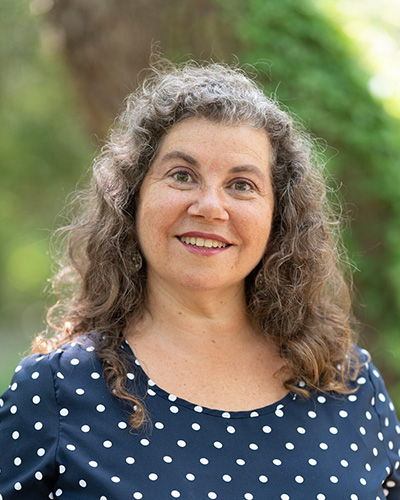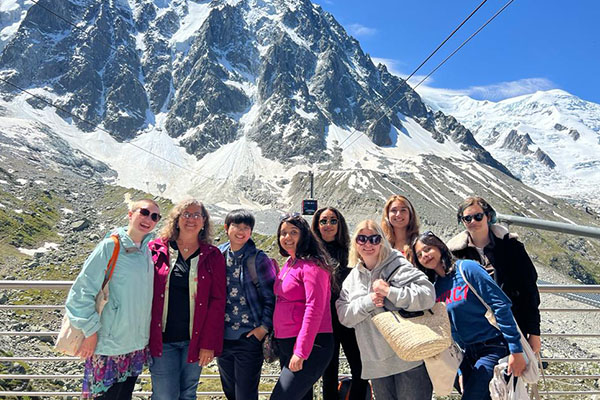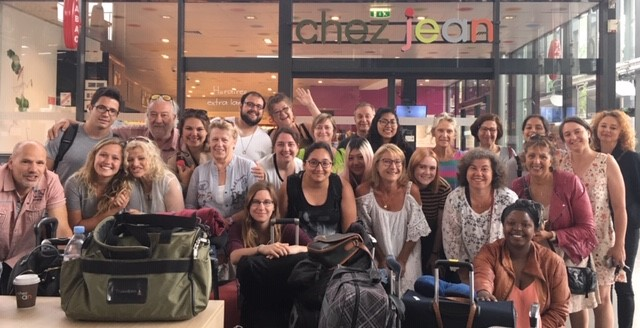Why study French?
French is the second most widely spoken language in the European Union. It is an official language in 29 countries. it is the spoken first language in France, Belgium, parts of Canada and Switzerland. More than 200 million people speak French on the five continents. French is both a working language and an official language of the United Nations, the European Union, UNESCO, NATO, the International Olympic Committee, the International Red Cross and international courts. French is the international language of cooking, fashion, theatre, the visual arts, dance and architecture. Estimates by 2050 denote that French will be one of the official spoken languages of the world.
Where is it spoken?
France, Belgium and parts of Switzerland in European Union. Canada and Haiti in North American continent. Western and North Western African Countries and Madagascar. Islands in the Pacific Ocean.

French Courses Offered
(3-2) 4 Credit Hours. (TCCN = FREN 1411)
Fundamentals of French offering the opportunity to develop listening, speaking, reading, and writing skills. Emphasis on listening and speaking. Introduction to French culture. May be applied toward the Core Curriculum requirement in Language, Philosophy and Culture.
Prerequisite: FRN 1014, the equivalent, an appropriate placement test score, or consent of instructor. Fundamentals of French offering the opportunity to develop listening, speaking, reading, and writing skills. Further study of French culture.
Prerequisite: FRN 2013, the equivalent, an appropriate placement test score, or consent of instructor. Continued opportunity to develop listening, reading, speaking, and writing skills. Grammar review and further study of French culture.
Major works of French literature across time, genres, and movements. May be applied toward the Core Curriculum requirement in Language, Philosophy and Culture. (Formerly FRN 3333. Credit cannot be earned for both FRN 2333 and FRN 3333.).
Prerequisite: FRN 2023 or consent of instructor.Development of oral and written language skills using contemporary readings, media, and oral discourse. Emphasis on increasing fluency through vocabulary expansion activities and selective grammar review. May be repeated for credit when topics vary.
Prerequisite: FRN 2023 or consent of instructor. Introduction to the basic context of the French economy and business world, with emphasis on development of practical language skills to deal with matters such as commercial correspondence, documents, reports, telecommunications, and conferences. Attention to vocabulary and style specific to French business. Practice in translation on business-related topics.
(3-0) 3 Credit Hours.
Prerequisite: FRN 2023 or consent of instructor. Selections from French literature and culture studied as reflections and interpretations of central movements in French cultural history. Introduction to concepts of style, genre, and period. May be repeated for credit when topics vary.
Prerequisite: FRN 2023 or consent of instructor. Focus on a specific area of French literature, from the medieval period through the 21st century. Selected texts are studied as examples of representative movements, genres, or authors in French literary history. May be repeated for credit when topics vary.
(0-0) 3 Credit Hours.
Prerequisites: Permission in writing (form available) of the instructor, the student’s advisor, the Department Chair, and the Dean of the College in which the course is offered. Independent reading, research, discussion, and/or writing under the direction of a faculty member. May be repeated for credit, but not more than 6 semester credit hours of independent study, regardless of discipline, will apply to a bachelor’s degree.
Prerequisite: Permission of Department Chair. Supervised experience in a setting that provides the opportunity to integrate theory and practice in language usage. May be repeated once for credit.
Prerequisite: Consent of instructor. An organized course offering the opportunity for specialized study not normally or not often available as part of the regular course offerings. Special Studies may be repeated for credit when topics vary, but not more than 6 semester credit hours, regardless of discipline, will apply to a bachelor’s degree.
All students pursuing the Minor in French must complete 18 semester credit hours at the 2000 level and above.
A. Required language skill courses
FRN 2013 Intermediate French I 3
FRN 2023 Intermediate French II 3
FRN 3023 Advanced Language Skills 3

Study Abroad
Learn more about your study abroad opportunities for French!
Previous Trips Have Included:
- Paris (9 days) and Annecy (21 days)
- Day trips to Versailles, Geneva, and Chamonix.
- Visits of museums, monuments, churches, and more...
- Language classes 5 days a week
- 21 days of homestay in Annecy
- Hiking in the Alps, swimming in The Lac d’Annecy, National music festival, Annecy international animation film festival, etc.
- Lots of great food and lots of free time to experience life à la francaise!

Highlights of Previous Study Abroad Trip:
The first department-sponsored study abroad trip to France took place in the summer of 2014. Six students (Kristen Brown, Sarah Gibbens, Kaylee Hernandez, Dylan King, Crystal Poenisch, and Nancy Sterniak) earned six hours of language credit studying at the Ifalpes Institute in Annecy and visiting Paris, Geneva, and other sites.
The students began their trip in Paris where they focused on sight-seeing. They visited L'Arc de Triomphe, took a boat ride on the Seine, enjoyed the art of the Louvre, rode the subway, walked through the Jardin des Tuileries, and visited La Tour d'Eiffel, both during the day and in the evening while it is lighted.
Montmartre, the artistic center of the Seine's right bank was another stop, including the Basilica of the Sacred Heart. Montmartre was the artistic center of the 19th century where great painters such as Monet, Van Gogh, Dali, and Picasso lived and worked.
The group also visiting the famous Palace of Versailles, easily recognizable as a setting for many American movies. Built by Louis XIV, the Sun King or Le Roi Soleil, it is considered to be the most beautiful castle in the world.
The Paris opera house, Palais Garnier, was another stop on the tour. Once the largest opera house in the world, it took 14 years to build and finally opened in 1874. Many great operas such as Bizet's Carmen premiered there and it was the setting for the Phantom of the Opera story.
After leaving Paris the group took the train to Annecy, which is in southeastern France, and began their classes at the Ifalpes Institute. They noted that in the Paris train station, four languages are used to provide information to travelers: French, English, Chinese, and German.
Annecy is the capital of Haute-Savoie and the greater metropolitan community comprises 58,000 people. Located in the Rhone-Alpes region on beautiful Lake Annecy, the city is often called the Venice of the Alps because of the charming canal system along the Thiou River. The study abroad group has already taken a city tour and visited the Palais de l'Isle, a prison built in 1132 and the most photographed building in town.
In between studying and learning French, the students visited the Ice Cave at Mont-Blanc, the highest point in the Alps where they hiked and visited the local towns.
Another day trip took the group to Geneva, Switzerland where they visited the UN headquarters and other attractions in the city.

